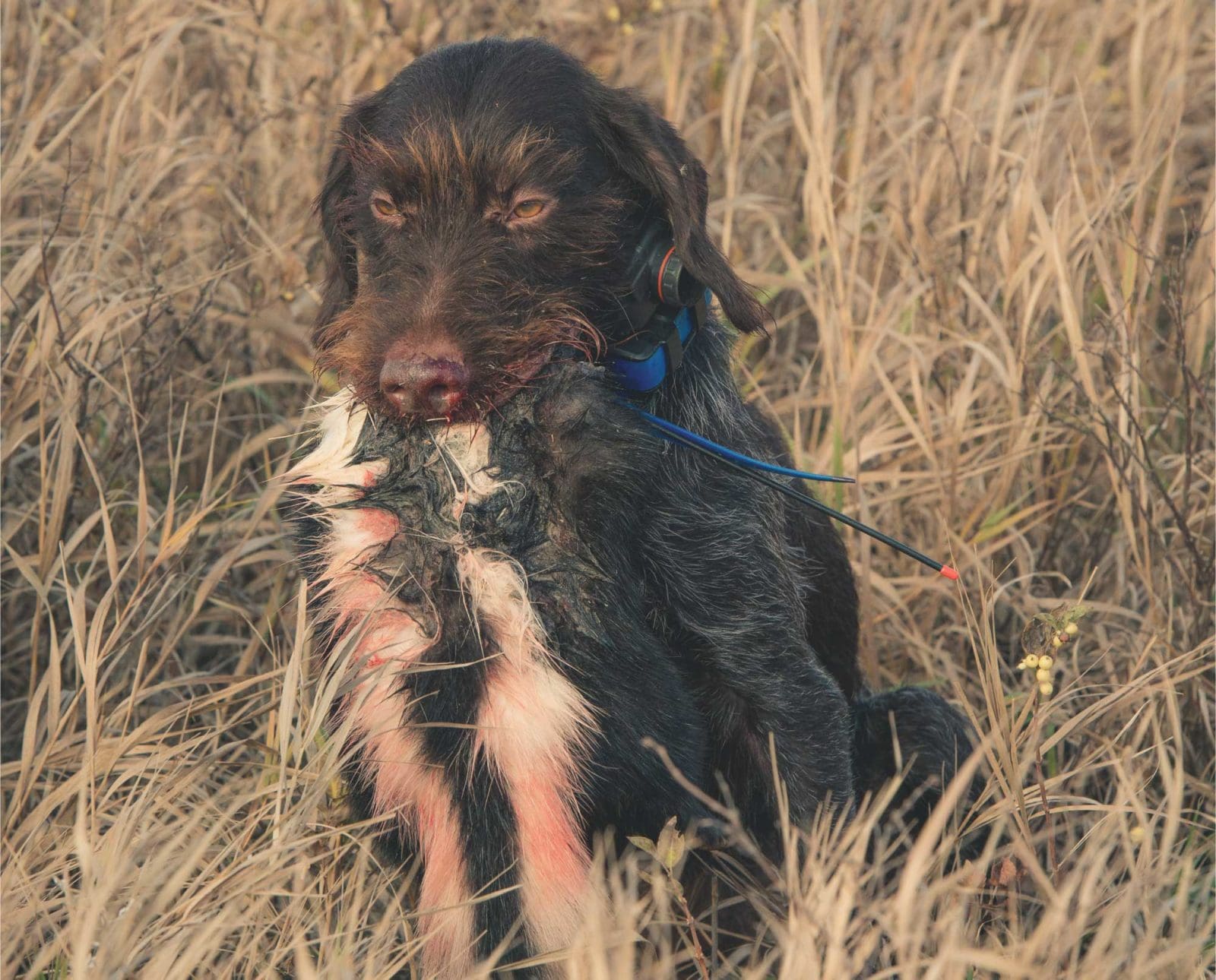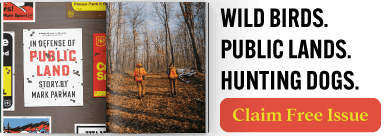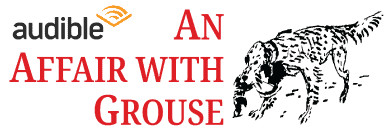Home » Hunting Dogs » What to Do When Your Dog Gets Sprayed by a Skunk
What to Do When Your Dog Gets Sprayed by a Skunk

A guide to de-skunking your dog and preventive practices to avoid those skunks in the first place.
While staring out my kitchen window one morning, I watched Rudy, my resident yard rooster, come sailing through the sky to land in the orchard down below my house. I quickly finished my morning tea and grabbed my two setters to see if we could rouse Rudy from his hiding place.
Listen to more articles on Apple | Google | Spotify | Audible
As expected, my two girls slammed beautiful points in the morning light. Of course, the place Rudy settled in was a native Montanan rose thicket. Cursing, I set forth to flush him from the brush, kicking and stomping as my annoyance grew with each broadening circle. Damn, was he holding tight this morning.
Suddenly, off to my right, I saw a small movement of branches.
“Get ‘em!” I yelled to my oldest English setter, Lark. She sprung like a fox into the bushes. Immediately after she landed, a dawning recognition filled my nostrils. It was too late. When you are close enough to a skunk event, you can actually hear the expression of their glands. In addition to being well and truly skunked, my dear Lark also received a bite to the lip for her direct landing on top of our black-and-white friend. Quickly, I moved all of us back to the nearest faucet.
Getting sprayed by a skunk poses risks to your dog
Skunk spray can be harmful to your dog’s eyes. It is common for dogs to be hit straight across the face by a skunk. If this occurs, it’s very important to flush your dog’s eyes out with copious amounts of water or saline. Dogs can get corneal damage from the discharge being in contact with their eye. Pawing at their own face can cause additional damage, too. Eyeball rinsing should be performed immediately. The quicker you remove the substance away from their nostrils and eyes, the better they will feel.
Rarely, some dogs develop severe anemia, or a decrease in red blood cells, post-skunking. This usually happens when the dog was skunked several times; for example, the lab who doesn’t take no for an answer. Heavily-skunked dogs should be monitored closely for any signs of lethargy, weakness, inappetence, or pale gums. If you notice anything out of the ordinary, seek veterinary care.
All hunting dogs should be kept current on their rabies vaccine. Bats are the primary reservoir for rabies in most places; however, skunks can also have outbreaks. Skunks can be found across North America and with the exception of Alaska, are a common sight in upland bird habitats, especially pheasant country. Healthy skunks are rarely aggressive except when cornered. Any skunk acting unusually should be given a wide berth.
De-Skunking your dog
Getting rid of that skunk smell has about as many home remedies as there are species of birds. None of them work 100 percent of the time, otherwise we’d only have one. Most preparations involve equal mixes of fresh 3% hydrogen peroxide, baking soda, and Dawn dish soap. Lemon or tomato juice might help add a zesty finish, but these liquids do not actually help break down the skunk musk and, as a result, are unnecessary.
Skunk odor is created by sulfur-containing organic compounds called thiols. In fact, thiols are added to natural gas to alert people of potential leaks through a rotten egg smell. The combination of hydrogen peroxide and baking soda releases oxygen, which helps neutralize thiols. Fresh or unopened 3% hydrogen peroxide is key. Just like with carbonated beverages, hydrogen peroxide loses its fizz and many of its chemical properties once opened.
Whichever recipe you choose, make sure you avoid your dog’s eyes. I have seen more dogs with corneal damage because owners got the de-skunking recipe in their eyes than from skunks themselves. There are also premixed, over-the-counter, skunk shampoos that can be quite effective and save you from having to be an amateur chemist. I carry the shampoo in my truck as it saves space and is instantly available.
To de-skunk your dog, put on disposable gloves. Wipe your dog down with dry paper towels and dispose of them. Next, apply your homemade mixture or pre-made skunk shampoo directly to the hardest hit areas on a dry dog. Do not rinse your dog first as it simply spreads out the musk. Allow the shampoo or homemade concoction to sit in place for about five minutes prior to rinsing. Know that some skunk-y essence will follow your dog around for months to come.
Warning: Be careful when mixing 3% hydrogen peroxide with baking soda
Hydrogen peroxide mixed with baking soda is flammable due to the oxygen production. It will also lighten the coats of dark-colored dogs and can bleach clothes. Over-the-counter shampoos are less likely to severely lighten your dog’s dark coat.
Reducing your skunk exposure risk:
Many dogs are hit by skunks in their own backyards. Skunks are attracted to food sources, so to reduce the risk of your dog getting sprayed at home, store all your pet feed inside, keep your chickens in closed coops at night, and ensure that all animal feed sources are properly stored. Check screens around your home’s vents for gaps several times a year. Close off under-deck access if possible or trim the vegetation around it.
Additionally, shooting skunks near hunting dogs may inadvertently cause those dogs to associate skunks as a target species. Moving your dog away from the skunk will help reinforce this is a critter we are not hunting. Skunk aversion courses also exist for those dogs with a black and white obsession.
It’s important to always believe your bird dog, but remember, they might not always be pointing at a bird. It could be a porcupine, a skunk, or something else. Hopefully, you’ll be able to avoid skunks altogether this season. If not, you’ll be glad you picked up that de-skunking shampoo after reading this article.




I’ve found that if you get to the smell asap it’s a huge help. I’ve used Dawn dishwashing detergent to grey affect. Otherwise the smell sets like a topical tick medicine — travels all over the dog. If you don’t get to it quickly the only thing that helps is to cover the smell with smelly shampoo etc. Btw my pointer got a skunk shot right in the eyes — it may have helped him in the future ‘cause now he doesn’t bother them!
The only way to fly is Skunk Off or Natures Miracle Skunk Remover. Just wipe it on liberally and let it dry. That’s it. Odor completely gone. With home remedies, you have to carry all ingredients and mix on the spot. It goes bad if saved. I always have 2 qts. Of Natures Miracle in my truck.
Never tried the store bought stuff. Always keep plenty of hydrogen peroxide in the bathroom cabinet. Don’t use equal parts, just a quart of HP, a cup of baking soda and a squirt of Dawn. Sponge it on and rinse it off and there is no smell. The dog does go from a dark brown to having light brown highlights, but he doesn’t care.
All of these articles act like it’s so hard to mix the homemade remedy in the field. As much as the store bought stuff costs, I’ll sacrifice a few extra inches of space for a small bucket with a quart bottle of hydrogen peroxide, a small tupperware container or baggie with a cup of baking soda, a small bottle of Dawn and a sponge to apply it all with. It works better anyway plus you can replenish it at nearly every store you shop at if you are on the road away from home.
After our Lab got skunked twice in one month an old timer gave us the tip of using Summer’s Eve douche …undiluted…applied all over the dog’s coat & left to dry …pulled almost all of the odor out. From then on there were always two bottles of Summer’s Eve in the hunting bag. Hope this helps.
I use Gojo Orange hand cleaner. It has minute pieces of pumice in it to get the oil off. It also has some conditioner in it for mechanics who use it on their greasy hands.Smells like oranges.No harm done to the dogs skin…just rinse thoroughly after rubbing it in.